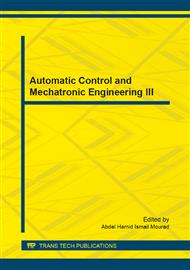p.382
p.387
p.391
p.395
p.402
p.409
p.415
p.420
p.426
Adaptive Maximization of Power Extraction of a Single Wind Turbine
Abstract:
Nowadays the application of extremum seeking controller in various engineering industry has attracted a high research attention. Also, it is one of the best known maximum power point tracking algorithm. It can drive the output to its extreme point automatically and dynamically stabilize around the equilibrium. In this paper, it is implemented via Matlab/Simulink. The extremum seeking control scheme controls the wind turbine to operate at its optimal rotational speed adaptively. Piecewise constant input wind will be applied.
Info:
Periodical:
Pages:
426-429
DOI:
Citation:
Online since:
August 2014
Authors:
Price:
Сopyright:
© 2014 Trans Tech Publications Ltd. All Rights Reserved
Share:
Citation:


